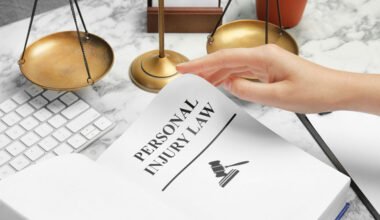Got hurt and wondering what’s next? Personal injury claims can feel like a maze, but with the right steps, you can walk through it with confidence.
Whether it’s a slip, trip, or unexpected mishap, knowing the process helps you protect your rights and get the compensation you deserve. No need to feel lost-this guide breaks it down into clear, easy moves.
Think of it as your roadmap from accident to resolution, with a few helpful shortcuts along the way. Let’s get you moving toward that win!
Seek Medical Attention
Even if you feel fine, injuries may appear later. Visit a doctor promptly to get checked and treated. Medical records will also serve as important evidence for your claim. Skipping this step could hurt your recovery and your case.
Also, keep all medical receipts and reports organized. Follow your doctor’s advice carefully to show you are taking the injury seriously. This helps prove the accident caused your condition.
Seeking medical care early also prevents complications. Remember, a solid claim starts with looking after your well-being from the very beginning.
Document the Accident
Write down every detail you remember about the incident while it’s still fresh. Note the time, date, location, and conditions. Include what happened before, during, and after the accident.
Additionally, gather names and contact information of witnesses. If police were involved, request a copy of their report. Small details can make a big difference later.
Even photos and videos of the scene can strengthen your case. The more complete your documentation, the easier it is to explain your side. Clear records help your lawyer and insurance company understand what happened.
Preserve Evidence
Hold onto anything that could prove what happened and who was at fault. This might include:
- damaged clothing
- broken items
- accident debris
Don’t forget to keep photographs of injuries and property damage. Store them in a safe place where they won’t get lost.
Avoid repairing or throwing away key items until your case is settled. Digital evidence, like text messages or surveillance footage, can also help. Acting quickly is important because some evidence can disappear over time.
The goal is to have clear, reliable proof to back up your claim. Well-preserved evidence can make your case stronger and more convincing.
Understand the Statute of Limitations
Every state has a deadline for filing personal injury claims, called the statute of limitations. If you miss this deadline, you may lose your right to seek compensation.
The time limit varies depending on where you live and the type of accident. That’s why it’s crucial to know the rules for your case as soon as possible.
A lawyer can explain your deadline and help you avoid costly delays. Acting quickly also keeps evidence fresh and witnesses’ memories sharp.
Don’t wait until the last minute. Protect your rights by understanding and respecting the legal timeframe for your claim.
Assess the Value of Your Claim
Determining the worth of your claim involves more than adding up medical bills. You should also consider lost wages, pain and suffering, and future expenses.
Some damages are easy to calculate, while others are more complex. A professional assessment can help you avoid undervaluing your case.
Remember that insurance companies may offer less than you deserve. So be sure you understand the full scope of your losses before agreeing to any settlement. This step ensures you fight for fair compensation.
Knowing your claim’s value helps you make smart decisions during negotiations and increases your chances of a better outcome.
Contact Insurance Companies
Notify your insurance provider promptly after an accident. Provide the basic facts, but avoid giving detailed statements until you understand your case fully. Anything you say can affect your claim, so be careful with your words.
Ensure to request a claim number and keep records of all communication. Save copies of letters, emails, and forms you submit. You may also need to contact the other party’s insurer if they are at fault.
Insurance companies handle claims daily, but your situation is unique. Being prepared helps you navigate the process more confidently and effectively.
Consider Legal Representation
Handling a personal injury claim alone can be overwhelming. An experienced lawyer, like this Florida car accident attorney, can guide you through the process and protect your rights.
They understand the law, gather evidence, and deal with insurance companies for you. Legal representation often increases your chances of getting fair compensation.
Many attorneys work on a contingency fee, meaning they only get paid if you win. This makes legal help more accessible. When the stakes are high, having the right professional by your side can make all the difference.
Engage in Negotiations
This step notifies the responsible parties and their insurers that you are seeking compensation. The claim should include information about:
- the accident
- your injuries
- the damages you’re requesting
Filing correctly and on time is essential to keeping your case active. Double-check that all required forms are complete and accurate. Mistakes or missing details can slow the process.
Having a personal injury lawyer review your paperwork can help avoid delays. Filing your claim promptly sets the legal process in motion toward resolution.
Prepare for Trial
If negotiations fail, your case may go to trial. This step requires careful preparation. Your lawyer will gather additional evidence, interview witnesses, and build a strong argument for the court.
Be ready to share your story clearly and honestly. Trials can take time, so patience is key. You may need to attend hearings or meetings before the actual trial.
The goal is to present your case in the most persuasive way possible. Even if you prefer to settle, being trial-ready shows you’re serious about your claim.
Your Roadmap to Winning Personal Injury Claims
Winning a personal injury claim takes knowledge, preparation, and persistence. By following each step, you can protect your rights and maximize your chances of success.
Don’t leave your future to chance-be informed and proactive. Your claim is your opportunity to get the justice and compensation you deserve. Start your journey today and take the right steps toward a stronger, more confident outcome.
Did you find this article helpful? Check out the rest of our blog now!



